Students from St. Aloysius Gonzaga Secondary School in Langata, Nairobi participated in a 10 kilometers AIDS awareness walk on Tuesday, 30th July 2024 in the streets of Kibera slums. Under the theme KNOWING MYSELF TO GROW MYSELF, the walk was part of the AIDS Awareness Day activities at the school supported by AJAN. The aim of the walk was to spread the message on Saying No to: New HIV infections among teenagers, Teen sex leading to teen pregnancies, Drugs and substance abuse.
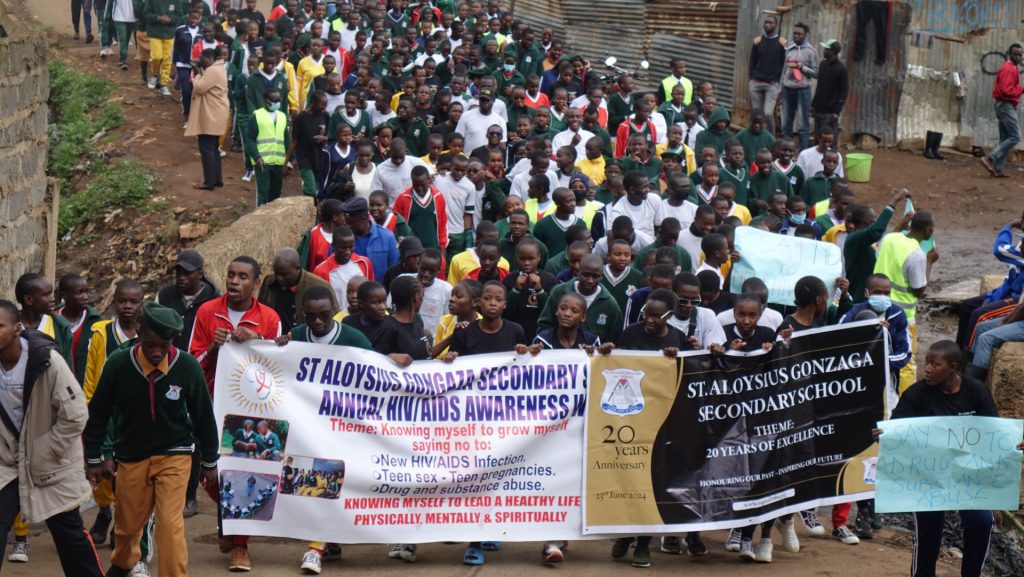
The AIDS awareness walk is one of the activities under the AJAN HIV and AIDS Prevention Program for the Youth (AHAPPY) program that the school through the students who are also trained as peer educators try to create community awareness of the dangers of immorality and why it is important for the young people to take the lead role in the fight against AIDS, with the belief that the awareness will spearhead change and make the young people responsible by them knowing themselves and growing themselves. Mr. Johnfisher Ondigo, coordinator of AHAPPY Activities at St. Aloysius Gonzaga Secondary School who was also behind the planning and Coordination of the AIDS awareness walk said, “Being a school, whose establishment was informed by the ravaging effects of HIV/AIDS across Kibera slums, our learners have been very instrumental in creating awareness about the HIV over the years. They have always put into good use the knowledge gained from AHAPPY generation manual by reaching out to their peers in the slums who hardly get the chance to benefit from lessons drawn from AHAPPY”.
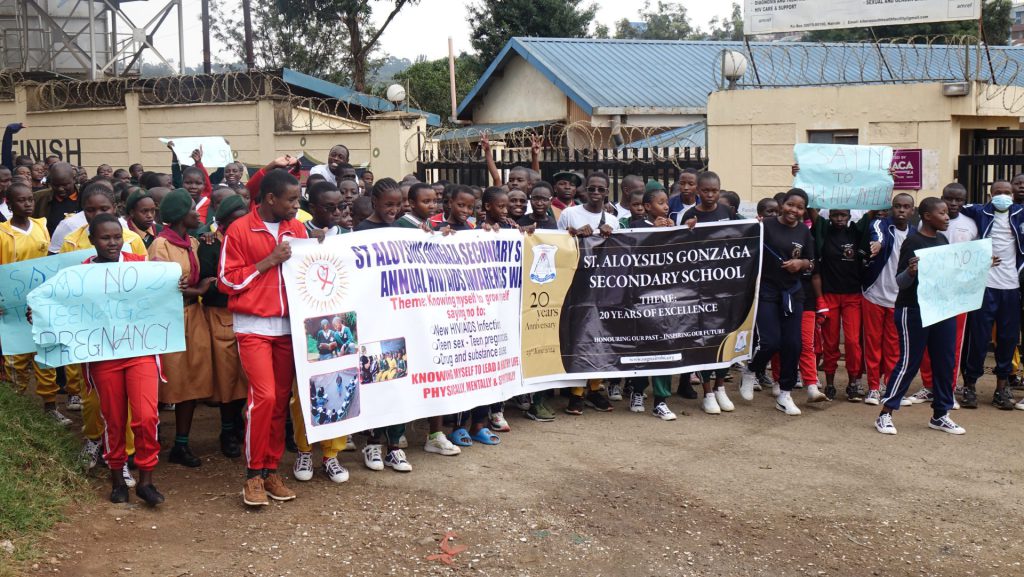
According to WHO report of 2021, Kibera is a slum in Nairobi, Kenya that has a population of 170,000 with an estimated HIV prevalence of 12%. Cultural beliefs, misinformation, and unsatisfactory education still hinders HIV prevention in slums and those already infected face poor living conditions and lack of access to quality healthcare. Extreme poverty has led to many young people being involved in drugs, with young women and children engaging in transactional sex for monetary gains. In an effort to support and cater for the young people that live in the slums of Kibera, St. Aloysius Gonzaga Secondary school founded in 2004 by Fr. Terry Charlton, a Jesuit Priest from US together with members of Christian Life Community (CLC). The school has over the years strived to provide free secondary education to cater for the educational needs of bright but needy students from the slum of Kibera. The primary target are the learners either affected or infected by the virus particularly those that had lost one or both parents to the AIDS epidemic.
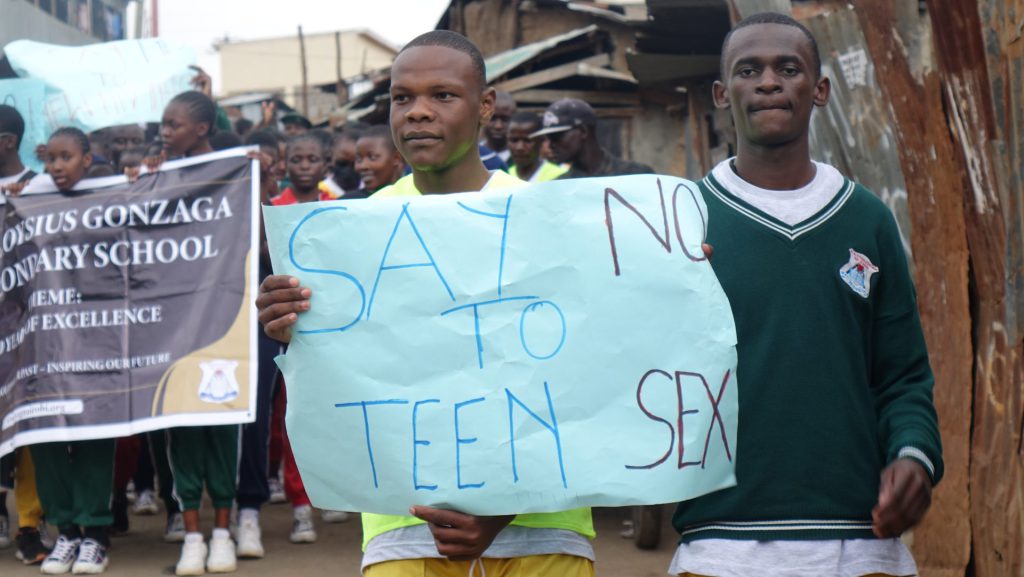
The school currently supports 280 students with secondary education. Since the pilot of the AHAPPY program in 2013, with both teaching and support staff being trained to accompany the young people. According to Mr. Johnfisher Ondigo, “Prior to the introduction of the program, the school was faced with myriads of challenges directly touching on the learners ranging from teen pregnancies, drug and substance abuse to general indiscipline. A year after introducing the program the turn-around was evident. The school recorded a drop in pregnancy cases from around ten teen pregnancies a year to almost zero.”
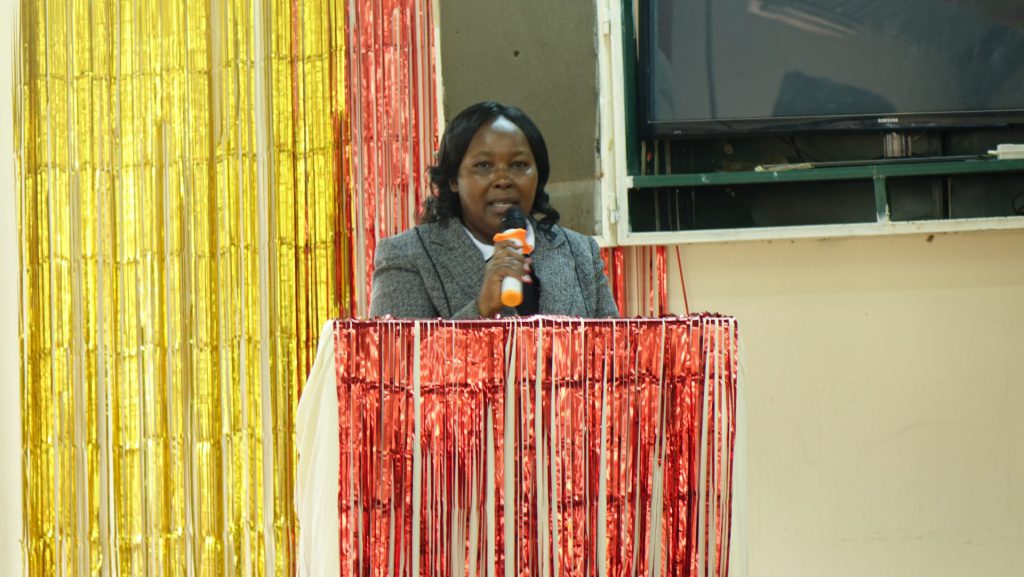
After the AIDS awareness Walk, St. Aloysius Gonzaga Secondary school principal Ms. Beatrice Maina, said, “ I thank the young people for having taken the AIDS awareness walk in the streets of Kibera, I also appreciate the teachers for accompanying them in this activity that was targeted at raising AIDS awareness in the community, without AJAN all this would not have been possible, they have been walking this journey with us since being established in 2002, we can attribute the holistic development and behavior change of our young people to the AHAPPY program and the support of the teaching and non-teaching staff within the school environment. We hope that we will continue walking this journey with them.”
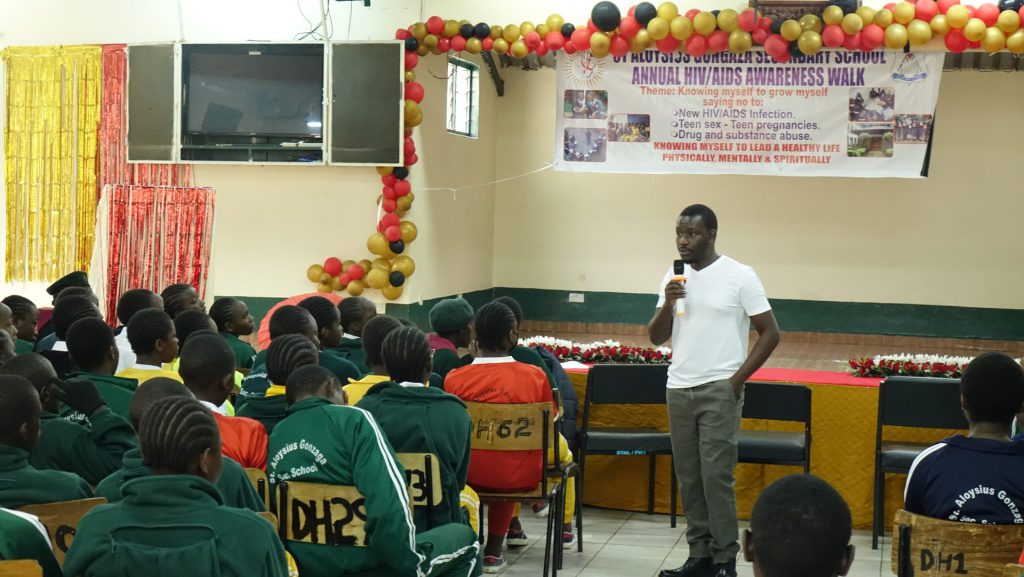
The Motivational speaker of the day, Mr. Pardingtone Nhundu Pan African Coordinator of the International Movements of Catholic Students in Africa, encouraged the young people to be responsible by sticking on their own lane, them knowing that they are responsible for the choices and decisions they make, youth being a stage of exploration the students were urged to use the Johari window tool for self-awareness. The Johari Window is split into four quadrants: the Open Area (things you know about yourself), the Blind Area (things you don’t know about yourself, but others do), the Hidden Area (things you know about yourself, but keep hidden), and the Unknown Area (things that are unknown to you and to others).
Thereafter, students took part in presenting short skits/plays, spoken word, dance competitions between individual and classes, drawings/work of art depicting the theme of the day and Singing with the winners being awarded for their creative displays.
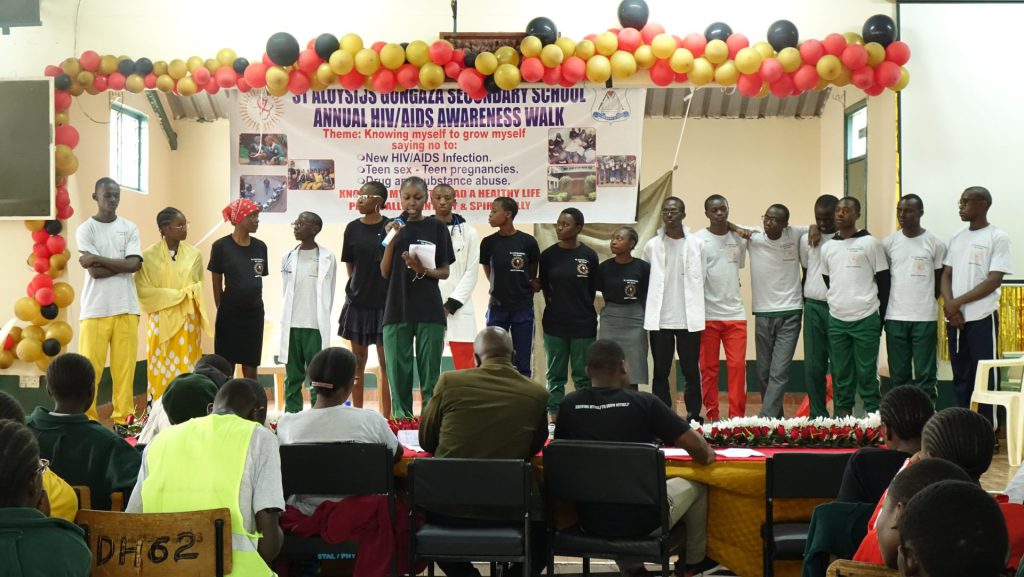
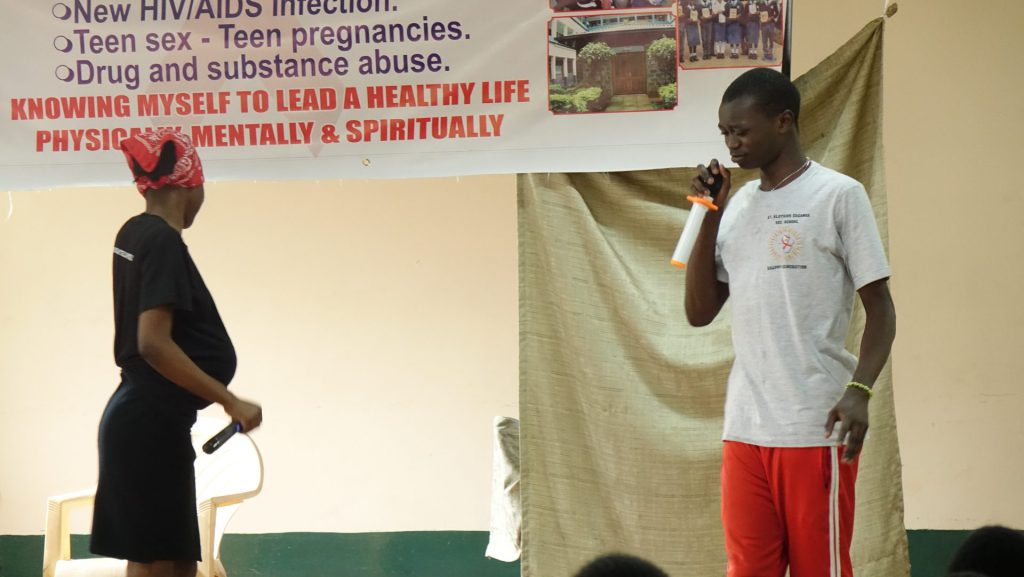
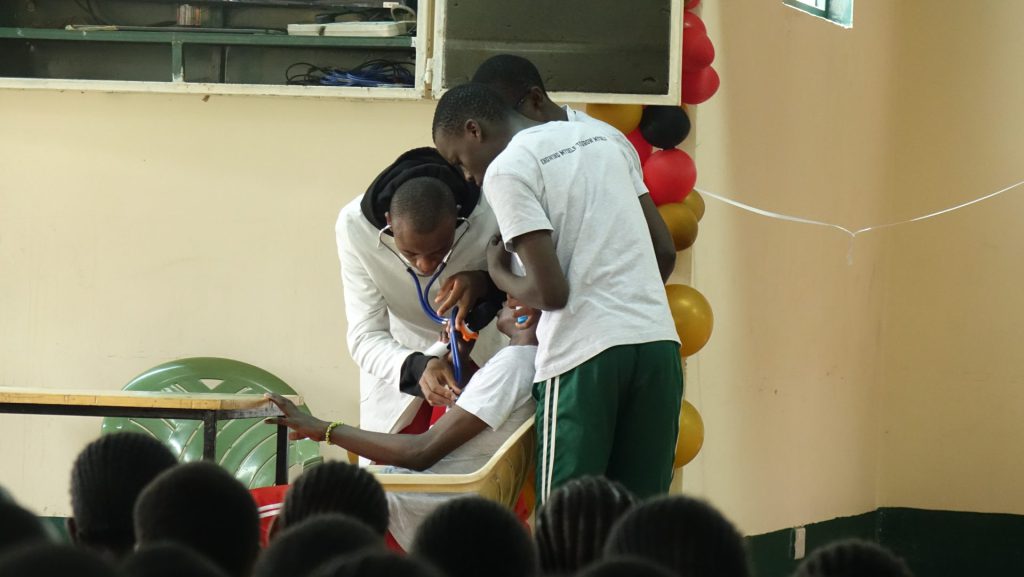
The day’s activities depicted what Peter Piot, founding Executive Director Joint United Nations Programme on HIV/AIDS (UNAIDS) 1995 until 2008, who once said, “Unless we involve the young people, train them, and provide them with the right equipment, they will be hurt by the raging epidemic that threatens us all. Given a chance to act and provided with the necessary skills, they may be the ones to reverse the current devastating trends. It is our responsibility to protect young people’s rights and ensure their participation in fighting the disease.”
By, Dennis Owuoche,
AJAN Communications Officer.

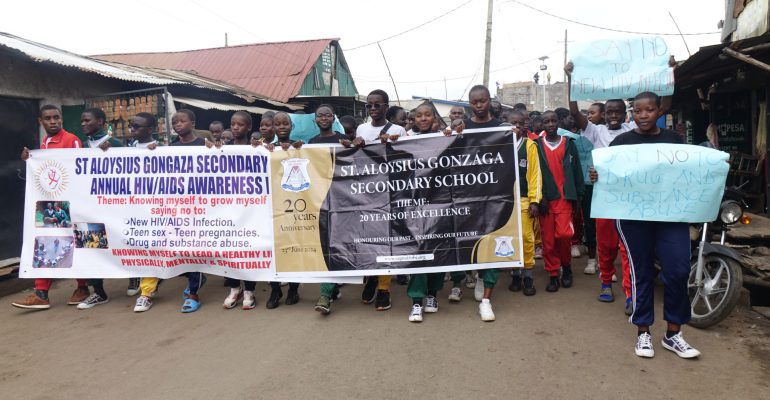
Comments are closed.